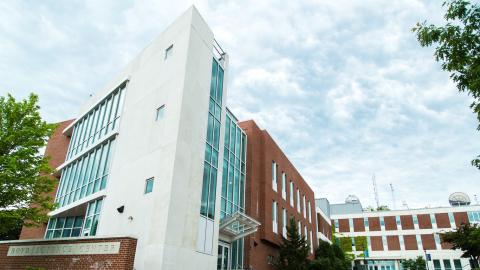Develop the ability to think analytically and creatively about environmental issues to be able to understand the scientific basis of environmental problems, as well as the social, political and economic factors that shape appropriate management and policy responses.
Environmental Science and Policy (ESP) is an interdisciplinary program designed to explore and understand the effects of humans on the Earth’s ecosystems, biodiversity, processes, and how changes to our planet affect humans. We examine past, current, and future environmental issues through a hands-on, minds-on approach that incorporates extensive outdoor and project-based learning experiences. Through a comprehensive core curriculum, students develop deep, applied understanding of the science of environmental issues and policy-based approaches to resolving them. The ESP program promotes engagement with off-campus partners (ex: federal and state agencies, non-governmental environmental stewardship groups) through class projects and customized student research and/or internship experiences. ESP program provides a springboard toward environmental careers in the public (e.g. government) and private (e.g., consulting, non-profit) sectors and the pursuit of graduate education.
Students customize their experience in the program by pursuing one of two program options: Policy and Planning or Science. Specialized courses distinguish each option. Both options lead to a Bachelor of Science (B.S.) degree.
- Policy and Planning: courses focus on regulatory and human behavior approaches to environmental challenges.
- Science: courses focus on measuring, monitoring and surveying the natural world to identify and understand mechanistic drivers of environmental problems.
Curriculum & Requirements
All students pursuing a B.S. degree in Environmental Science and Policy will complete a core set of interdisciplinary courses. In addition, students will pursue a focused suite of courses that correspond to one of two program options: Policy and Planning or Science. Students are required to declare an option when joining the Environmental Science and Policy program, but the choice can be revised during pursuit of the degree.
Depending on a student’s Math Placement Level*, preparatory courses may need to be taken prior to registering for MA 1800 College Algebra (math requirement for Policy and Planning option) or Precalculus (math requirement for the Science option).
*Math level is determined through the Math Placement Assessment required for all students. General Education
Complementary Courses
Students pursuing the Environmental Science and Policy degree are encouraged to consider an undergraduate research project, an internship, a GIS Certificate, or one or more minors. Free electives and up to 2 courses in the ESP major can be used to fulfill requirements in a minor such as Chemistry, Sustainability, Biology or Business, among others.
1Directions in this major should total a minimum of 16 credits, excluding SIDI which is waived. Students who choose all 4-credit Directions courses can satisfy this Gen Ed requirement with 4 courses, total. Choosing any one 3-credit Directions course will necessitate at least 5 Directions courses to reach the 16 credit minimum.
Science Option of BS Environmental Science and Policy
| Course | Title | Credits |
|---|---|---|
| Environmental Science Option Requirements | ||
| CH 2335 | General Chemistry I (QRCO) | 4 |
| ESP 3310 | Hydrology | 4 |
| CH 2340 | General Chemistry II | 4 |
| or PH 2110 | College Physics I | |
| Science Elective | ||
| Complete one course from the following: | 3-4 | |
ESP 4310 | Advanced Conservation Ecology | |
BI | 3000/4000 level Biology course | |
| General Education: Math Foundation Choose one | ||
| MA 2130 | Precalculus (QRCO) | 4 |
| or MA 2550 | Calculus I (QRCO) | |
| Total Credits | 19-20 | |
Policy and Planning Option of BS Environmental Science and Policy
| Course | Title | Credits |
|---|---|---|
| Environmental Policy and Planning Option Requirements | ||
| EPL 2105 | Community Planning | 4 |
| SU 3115 | Economic and Ecological Sustainability (GACO,QRCO) | 4 |
| or ESP 3340 | Introduction to Ecological Economics | |
| ESP 4325 | Decision Making in Environmental Management | 4 |
| Policy and Planning Electives | ||
| Complete one course from the following: | 3-4 | |
ESP 3600 | Special Topics in Environmental Policy | |
ESP 3310 | Hydrology | |
ESP 3550 | Environment and Health (WECO) | |
ESP 3800 | Food Systems: Social, Economic and Environmental Impacts of Modern Agriculture (DICO,WECO) | |
ESP 4200 | Natural Hazards: Science and Policy | |
ESP 4305 | Land Conservation Techniques | |
ESP 4310 | Advanced Conservation Ecology | |
EPL 3100 | Environmental Planning | |
SO 4415 | Methods of Social Research (TECO) | |
LAW 3300 | Real Estate Law | |
PO 2025 | Public Administration (DICO) | |
PO 3060 | Political Analysis and Policy (WRCO) | |
CH 2335 | General Chemistry I (QRCO) | |
CH 2340 | General Chemistry II | |
PH 2110 | College Physics I | |
BI | 3000/4000 level Biology course | |
| General Education: Math Foundation | ||
| MA 1800 | College Algebra | 3 |
| Total Credits | 18-19 | |
Check all course descriptions for prerequisites before planning course schedule. Not all courses are offered every year. The course sequences listed below are recommendations only. To complete the bachelor’s degree in 4 years, you must successfully complete a minimum of 15 credits each semester or have a plan to make up credits over the course of the 4 years. For example, if you take 14 credits one semester, you need to take 16 credits in another semester. Credits completed must count toward your program requirements (major, option, minor, certificate, general education or free electives).
Policy and Planning Option of BS Environmental Science and Policy
Check all course descriptions for prerequisites before planning course schedule. Course sequence is suggested but not required.
| Year One | Credits | |
|---|---|---|
| ESP 1500 | Introduction to Field Techniques | 3 |
| ESP 2100 | Introduction to Environmental Science and Policy I | 4 |
| ESP 2110 | Introduction to Environmental Science and Policy II | 4 |
| GE 2050 or CS 2010 or CS 2521 |
GIS I: Introduction to Geographic Information Systems (QRCO,TECO) or Computing Fundamentals (TECO) or Introduction to Electromechanical Technology |
4 |
| IS 1115 | Tackling a Wicked Problem | 4 |
| EN 1400 | Composition | 4 |
| MA 1800 | College Algebra | 3 |
| Directions (choose from CTDI, PPDI, SSDI) | 4 | |
| Credits | 30 | |
| Year Two | ||
| EPL 2105 | Community Planning | 4 |
| ESP 2305 | Foundations of Environmental Policy (WRCO) | 4 |
| ESP 3335 | Environmental Geology (TECO) 3 | 4 |
| MA 2300 | Statistics I (QRCO) | 3 |
| Directions (choose from CTDI, PPDI,SSDI) | 6-12 | |
| WECO | Wellness Connection | 3-4 |
| ESP/EPL/GE 3000/4000 Electives (#cr must be ESP) | 3-4 | |
| Elective | 3-6 | |
| Credits | 30-41 | |
| Year Three | ||
| ESP 3326 | Climate, Risk, and Adaptation (GACO) | 3 |
| ESP 3201 | Energy and Society | 4 |
| BI 3240 | Conservation (DICO,GACO) | 3 |
| ESP 3340 | Introduction to Ecological Economics | 3 |
| ESP 4305 | Land Conservation Techniques | 4 |
| ESP @3/@4 Complete one Policy and Planning Elective | 3-4 | |
| ESP | 3000/4000 level ESP/EPL/GE elective (3 cr must be ESP) | 3-6 |
| Directions (choose from CTDI, PPDI, SSDI) 1 | 3-4 | |
| Elective | 3-6 | |
| Credits | 29-37 | |
| Year Four | ||
| ESP 4550 | Environmental Science and Policy Seminar (WRCO) | 4 |
| ESP 4325 | Decision Making in Environmental Management | 4 |
| ESP 4305 | Land Conservation Techniques | 4 |
| ESP | 3000/4000 level ESP/EPL/GE elective | 3-6 |
| Electives | 18-24 | |
| ESP @3/@4 ESP Policy and Planning Elective (choose one) | 3-4 | |
| Credits | 36-46 | |
| Total Credits | 125-154 | |
- 1
Directions should total 16-17 credits because SIDI is waived for BS Environmental Science and Policy, Policy Option.
- 2
For all students who have completed ESP 2100.
- 3
For all students who have completed ESP 3335.
Science Option of BS Environmental Science and Policy
Check all course descriptions for prerequisites before planning course schedule. Course sequence is suggested but not required.
| Year One | Credits | |
|---|---|---|
| ESP 1500 | Introduction to Field Techniques | 3 |
| ESP 2100 | Introduction to Environmental Science and Policy I | 4 |
| ESP 2110 | Introduction to Environmental Science and Policy II | 4 |
| IS 1115 | Tackling a Wicked Problem | 4 |
| EN 1400 | Composition | 4 |
| MA 2550 or MA 1800 and MA 2130 |
Calculus I (QRCO) or College Algebra and Precalculus (QRCO) |
4 |
| MA 2130 or MA 1800 and MA 2130 |
Precalculus (QRCO) or College Algebra and Precalculus (QRCO) |
4 |
| CH 2335 | General Chemistry I (QRCO) 1 | 4 |
| CH 2340 or PH 2110 |
General Chemistry II 1 or College Physics I |
4 |
| GE 2050 or CS 2010 or CS 2521 |
GIS I: Introduction to Geographic Information Systems (QRCO,TECO) or Computing Fundamentals (TECO) or Introduction to Electromechanical Technology |
4 |
| Credits | 39 | |
| Year Two | ||
| ESP 3335 | Environmental Geology (TECO) | 4 |
| ESP 2305 | Foundations of Environmental Policy (WRCO) | 4 |
| PPDI | Past and Present Direction | 3-4 |
| MA 2300 | Statistics I (QRCO) | 3 |
| SSDI | Self and Society Direction | 3-4 |
| Elective | 6-8 | |
| Credits | 23-27 | |
| Year Three | ||
| ESP 3201 | Energy and Society | 4 |
| ESP 3310 | Hydrology | 4 |
| ESP 3325 | Climate, Risk, and Adaptation (GACO,INCO) | 3 |
| ESP | 3000/4000 level Elective in ESP/EPL/GE/SU | 3 |
| BI 3240 | Conservation (DICO,GACO) | 3 |
| CTDI | Creative Thought Direction | 3-4 |
| Directions (choose from CTDI, PPDI, SSDI) 1 | 4-8 | |
| WECO | Wellness Connection | 3-4 |
| Elective | 0-2 | |
| Credits | 27-35 | |
| Year Four | ||
| ESP | 3000/4000 level elective in ESP/EPL/GE/SU | 4 |
| ESP 4550 | Environmental Science and Policy Seminar (WRCO) | 4 |
| Complete one Science Elective from the following: | 3-4 | |
ESP 4310 |
Advanced Conservation Ecology | |
BI | 3000/4000 level Biology course |
|
| Electives | 15-16 | |
| Credits | 26-28 | |
| Total Credits | 120 | |
- 1
Directions should total 16-17 credits because SIDI is waived for BS Environmental Science and Policy, Policy Option.
- Integrate natural and social science concepts, theories, and methods to address interdisciplinary environmental issues
- Value, incorporate and practice diverse, inclusive perspectives on environmental issues
- Demonstrate open, critical and systems thinking when evaluating and solving environmental problems
- Work effectively within a team to understand and assess environmental systems, policies, and management plans
- Identify and describe key environmental policy and regulations as they relate to environmental issues
- Identify and incorporate stakeholders in local, state, and federal environmental issues
- Integrate natural and social science methods to monitor, evaluate, and manage environmental systems
- Understand the processes by which environmental policy and regulation is created and revised
- Conduct qualitative and quantitative environmental research and report findings to peers, environmental professionals (e.g. managers, policy makers), and public audiences
Students graduating with a BS degree in Environmental Science and Policy find rewarding careers in state and federal environmental agencies, non-profit organizations, and private consulting firms. Prior to joining the workforce or while employed, some graduates choose to pursue graduate degrees and/or post-bac certificates. Common positions include:
- Seasonal/Permanent Field Technician
- Lab Technician
- Environmental Quality Analyst
- Environmental Consultant
- Environmental Stewardship Coordinator
- Environmental Educator
- Environmental Scientist
- Hydrologist/Hydrologic Technician
- Fish Biologist
- Aquatic Ecologist
- Physical Scientist
- Environmental Protection Agency Inspector
- Park Ranger
- Planner
- Environmental Compliance Analyst
- Sustainability Coordinator
Explore Program Details

The heart of scientific research and study at PSU is the Boyd Science Center. The University’s proximity to the lakes, rivers and mountains of New Hampshire gives students access to a unique natural laboratory. Resources at Boyd provide students with a place to explore nature’s questions, generated in the great outdoors or under the microscope.
Resources at Boyd
- Climate-controlled chambers for whole organism research
- Dedicated spaces for student research
- PCR, Rt-PCR, Western blotting, Immunohistochemistry
- Animal behavior lab with advanced video tracking
- BSL-2 Microbiology lab
- Six 300-liter marine aquariums
- Human physiology lab
- Collection of bird specimens
- Dedicated tissue culture facility
- Rooftop greenhouse with computerized temperature controls and separate areas for preparation and growing
- PSH, an herbarium of 20K preserved and mounted specimens
Explore Today.
Realize Tomorrow.









